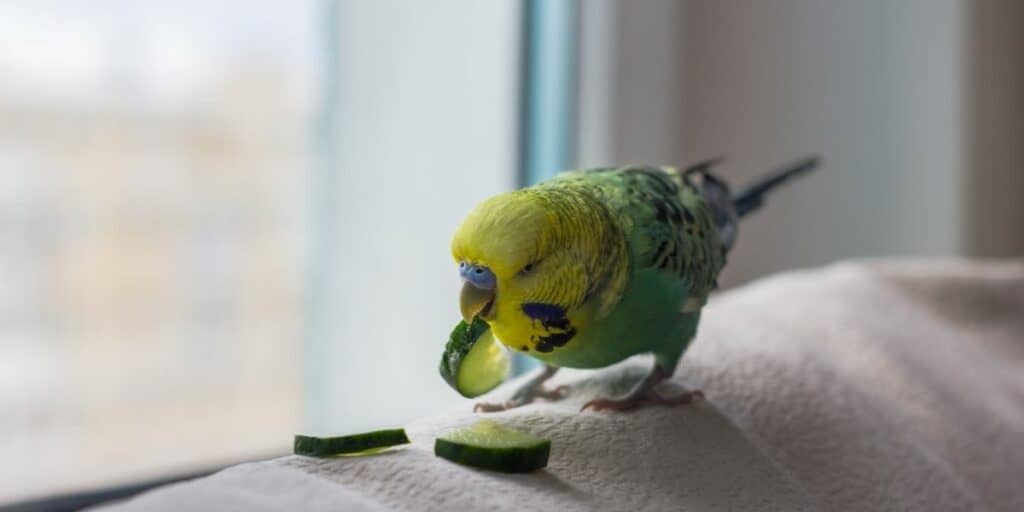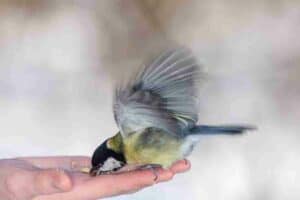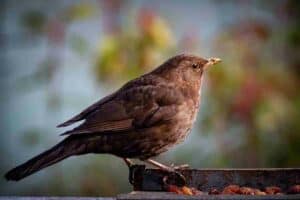It’s well known that chocolate is bad for some animals. Giving them even a modest bit of chocolate could result in terrible consequences.
For certain smaller breeds, this implies death, whereas, for larger breeds, it indicates significant diseases.
What about birds? Could they do better if one offered them chocolate? Or is it also harmful and toxic to them?
Certainly not! Birds should not be given chocolate. While a chocolate bar may be the ideal treat for people, it can be fatal to birds, even in small doses. Chocolate contains two chemicals that are hazardous to birds. This is the combination of caffeine and theobromine.
These compounds raise their heart rate. Considering their small size, the pressure on the bird’s hearts becomes too much for them to withstand.

The bird suffers a heart attack as a result and, in severe cases, death. Furthermore, chocolate will be difficult for birds to defecate.
Table of Contents
What Makes Chocolate Poisonous To Birds?
Every backyard birder or pet owner wants to provide decent, nutritional food for their feathered friends. Birds, like humans, like eating a variety of delicacies.
They likely demand anything they see their owner chewing on, and it might be tempting to give a bite.
So why can’t birds eat chocolate when people do it all the time? What exactly is it about chocolate that makes it so harmful to birds?
This meal is one of the most dangerous to birds since it includes two dangerous compounds:
Theobromine: Theobromine is a kind of methylxanthine, an alkaloid molecule found in cocoa beans.
Because these beans are used to manufacture chocolate, theobromine is present in every chocolate.
Theobromine, just like caffeine, is safe for humans to consume but possibly hazardous to birds.
Unlike humans, birds are unable to metabolize theobromine found in chocolate adequately.
Because birds are considerably smaller than humans, it doesn’t take much to push them over the brink.
Caffeine: Caffeine is the most well-known component of the coffee bean, although it is present in minute levels in chocolate.
Because of our size, we will not even notice the caffeine in chocolate.
However, caffeine in chocolate has an immediate effect on birds, just like Theobromine.
Milk: Chocolate contains milk. Birds can’t digest, so it makes them sick at the very least. It can potentially be lethal in some cases.
What Will Happen If A Bird Ate Chocolate?
It all boils down to theobromine and caffeine, compounds found in chocolate. Both compounds are employed as a diuretic, heart stimulants, blood vessel dilators, and smooth muscle relaxants in medicine.
Humans seek this effect, and they can get away with it since humans metabolize the substances relatively fast.
On the other hand, birds do not have the same ability as humans to digest theobromine and caffeine.

They cannot break it down as quickly as people, and since they are so little, even minute levels of sugar, caffeine, artificial flavoring, and coloring can have a disproportionately huge influence on their health, and the effects are more noticeable.
The toxic consequence of the slow metabolization of caffeine and theobromine is that they have the potential to upset your bird’s stomach, resulting in vomiting and diarrhea.
What’s more, too much chocolate in the diet can harm birds increase heart rate, tremors, and seizures. Seizure is the main cause of the death of birds.
Are All Types Of Chocolate Toxic To Birds?
The quantity of caffeine and theobromine in chocolate varies depending on the kind of chocolate. The darker the chocolate, the more cocoa it contains, enhancing its toxicity to birds in terms of caffeine and theobromine.
White chocolate is, in fact, safer for birds than any other chocolate.This is because white chocolate has less cocoa than dark chocolate.
These chocolates use cocoa butter instead of cocoa. In some ways, these shouldn’t even be termed “chocolate.”
Therefore, the toxins found in cocoa (caffeine and theobromine) are substantially lower in white chocolate than in other chocolates.
However, white chocolate is potentially harmful, but since it contains less caffeine and theobromine, it takes a lot of white chocolate to be poisonous to your bird.
NOTE:
While birds could love to enjoy the lovely sweet taste of chocolate just as much as people do, it’s vital to remember that regardless of the type of chocolate available in the market, they are all deadly to birds and can cause them to get extremely ill and, in some cases death.
So, no matter how much you can’t refrain from giving your bird a piece of chocolate, keep in mind that bird and chocolate don’t mix.
If Not Chocolate, What Safe Treats Can You Give Your Bird?
There are several healthy, bird-safe snacks that your bird will appreciate.
Fruits: Almost any fruit you can think of is good for your bird’s diet. Mangoes, apples, bananas, and berries, just to name a few, are all tasty and healthy.
They can be grated or sliced in half and hung to allow birds to peck at the soft flesh of the fruit.
Vegetables: Birds eat a wide array of vegetables. Give your pet some thoroughly cleaned and rinsed broccoli, yellow squash, or greens.
Nuts: Nuts are incredibly nutritious to birds. They offer several nutritional advantages, they are also delicious, and many birds consider them special treats.
Seeds: Sunflower and safflower seeds are abundant in nutrients for birds, although different species prefer them.
Final Thoughts
Birds are excellent indoor pets. These creatures aren’t only cute; they’re also full of personality. They’re adorable pets who deserve to be admired.
However, like with any other pet, the owner must ensure that their pet bird is fed the proper nutrition.
Whatever type of chocolate you decide to give your bird, it’s still poisonous. Dark and white chocolate are hazardous to birds in the same way that milk chocolate is.
Similarly, whether chocolate is offered in the shape of a cookie, chocolate bar, or chocolate milk is still poisonous.
Look for bird’s snacks that are particularly made to appeal to your feline’s senses while also providing a wide range of health advantages.
Choose snacks that are not only delicious but also contain nutrients that will help your bird’s nutrition health.











